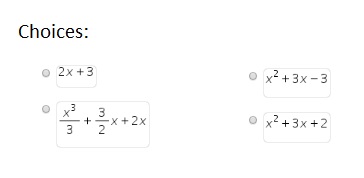The second fundamental theorem of calculus states that for some function f(x) that is continuous over the interval [a, b] (where a is a constant), there exists a function F(x) = int_(a)^(x) f(t) d t.
This means that F(x) is an antiderivative of f(x), or F'(x) = f(x), for all x in b.
Rightarrow frac(d)(dx) (int_(a)^(x) f(t) d t) = f(x)
Let's substitute our function into this form:
Rightarrow frac(d)(dx) (int_(- 3)^(x) (t^(2) + 3 t + 2) d t) = x^(2) +3 x + 2
therefore F'(x) = x^(2) + 3 x + 2
Now that we have F'(x), we can evaluate its antiderivative, which will give us F(x).
First, let's evaluate the indefinite integral of F'(x):
Rightarrow int(x^(2) + 3 x + 2) d x = int(x^(2)) d x + int(3 x) d x + int(2) d x
Rightarrow int(x^(2) + 3 x + 2) d x = frac(x^(2 + 1))(2 + 1) + frac(3 x^(1 + 1))(1 + 1) + 2 x + C
therefore int(x^(2) + 3 x + 2) d x = frac(x^(3))(3) + frac(3 x^(2))(2) + 2 x + C
Then, let's calculate the definite integral in the interval [- 3, x]:
Rightarrow int_(- 3)^(x) (x^(2) + 3 x + 2) d x = F(x) - F(- 3)
Now, F( -3) = int_(- 3)^(- 3) (x^(2) + x + 2) d x = 0, because the integration is being done over an interval of length 0:
Rightarrow int_(- 3)^(x) (x^(2) + 3 x + 2) d x = (frac(x^(3))(3) + frac(3 x^(2))(2) + 2 x) - (0)
Rightarrow int_(- 3)^(x) (x^(2) + 3 x + 2) d x = frac(x^(3))(3) + frac(3 x^(2))(2) + 2 x
Rightarrow int_(- 3)^(x) (x^(2) + 3 x + 2) d x = frac(x^(3))(3) + frac(3)(2) x^(2) + 2 x
therefore F(x) = frac(x^(3))(3) + frac(3)(2) x^(2) + 2 x


